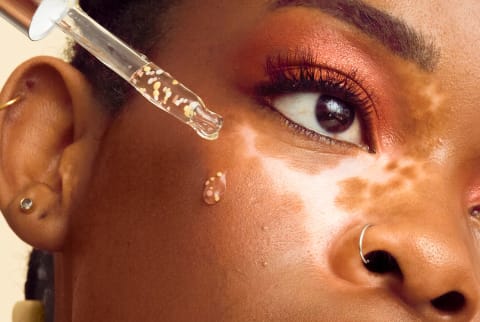Advertisement
Do Trendy Collagen Serums Actually Work? Here's What You Need To Know


There are plenty of things you can do to encourage graceful skin aging, but is investing in a "collagen-boosting serum," one of them? According to a market report published by Spate, there are 14.6K searches every month in the U.S. for "collagen serum," which means beauty fans are growing more and more curious about these trendy topicals. However, it's time we separate fact from fiction: Here, we looked to advice from board-certified dermatologist Dendy Engelman, M.D., about topical vs. oral collagen to get to the bottom of this claim.
Do collagen serums work?
We know that collagen production naturally declines with age1. This can lead to physical skin aging in the form of fine lines, wrinkles, and an overall reduction in skin elasticity (i.e., factors that directly contribute to a tight, youthful appearance).
So to achieve younger-looking skin, you'll want to restore that natural reserve of collagen the best you can—makes sense, no? The question remains: Do topical collagen serums actually boost collagen production?
Truth be told, it's just a marketing tactic. "Collagen is a huge molecule that sits on the surface of the skin and cannot be absorbed into the dermis," Engelman once shared with mbg. "When applied topically, it is not possible for collagen to penetrate, which is why we use other actives to stimulate collagen production."
The other active ingredients Engelman is referring to are things like retinol, retinoids, or chemical exfoliants, like glycolic acid. These products are effective in terms of spurring your natural collagen production process, but no topical can supply your skin with more collagen itself.
If you are interested in improving collagen production, the answer is to leverage collagen supplements for inside-out skin care benefits rooted in science2.* Research shows hydrolyzed collagen supplements are able to enhance your body's own collagen production1 by stimulating fibroblasts, those same cells that make collagen and elastin to begin with.* This will support your skin's elasticity and dermal density3—two major factors that contribute to that tight, youthful look.*
Of course, not all collagen supplements are created equal. Make sure the formula you choose comes with a clinically useful dose, clean ingredients, and ideally includes vitamin C, as the antioxidant is required in collagen formation in the body.* For what it's worth: mindbodygreen's beauty & gut collagen+ contains 17.7 grams of grass-fed collagen peptides (types I and III), as well as hyaluronic acid, vitamins C and E, biotin, L-glutamine, turmeric, and sulforaphane from broccoli to support skin health from multiple angles.*
The takeaway.
At the end of the day, the term "collagen-boosting serum" is a marketing tactic that lacks scientific support. If you want to support your own collagen production through the use of topical products, stick to retinol, retinoids, or chemical exfoliants. And if you want to improve collagen from the inside out, consider investing in hydrolyzed collagen supplements—you can learn more about their benefits here.*
